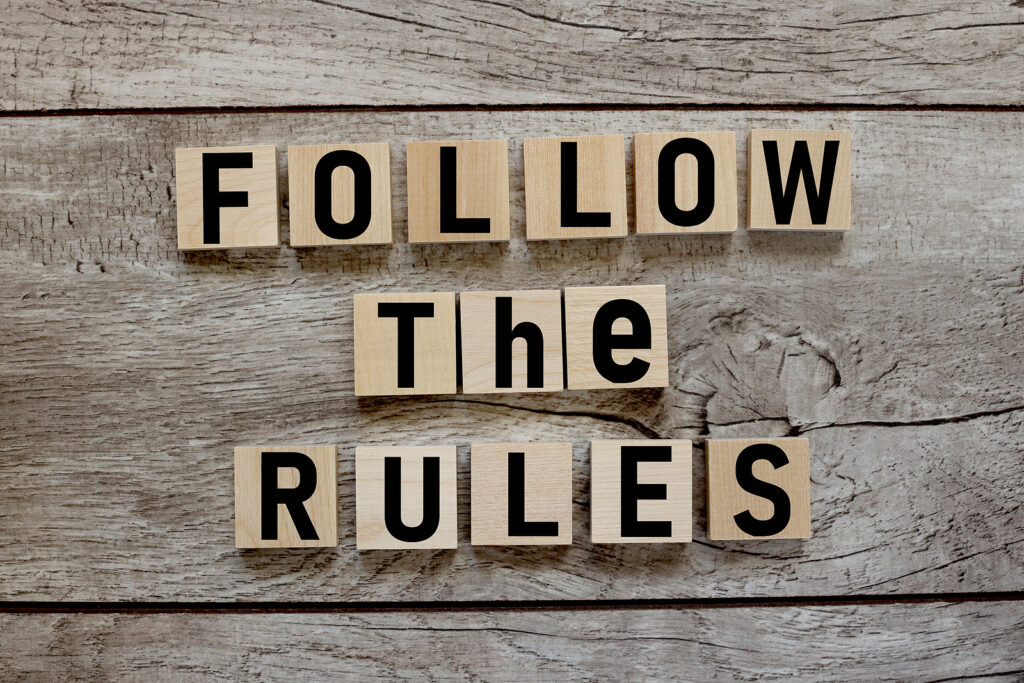
Yes, that’s a picture of me as a teenager when I worked as a cashier at Burger King (as you can tell, I was super pumped for my upcoming shift 😅).
Despite my less-than-thrilled face, admittedly, I met some lovely humans (both coworkers and customers) while I worked there. But I’m not going to lie, either. The amount of rude, thoughtless and entitled customers that I dealt with on my shift made me lose my faith in the goodness of humanity on most days.
I was asked to be a model of customer service excellence while I worked there, but privately, that kid wished that there was a guide for the general public on how to become a good customer.
No, scratch that–not a “good” customer, an Epic Customer.
So, 35 years later, I decided to create that guide–and just in time for the holiday shopping season.
Following are the 18 inescapable laws of becoming an Epic Customer. I created this list both from my years as a customer service professional, and from what I learned from my students in my previous career as a customer service trainer.
I’m going to skip past the obvious stuff like saying, “please”, “thank you” and “excuse me” when communicating with customer service professionals, and tipping appropriately in restaurants because hopefully you’re already doing those things (you are, right?)
Remember, making the world a kinder place is a responsibility for people on both sides of the customer service encounter.
And for clarity’s sake, I’m writing this post to the non-epic customers of the world. So, when you read “you”, I’m not actually referring to you, dear reader. Well…unless you’re in violation of any of the 18 Laws below, then I’m most definitely talking to you.
Last thing–please don’t dismiss what you’re about to read as “common sense”, because if you’re paying attention, common sense isn’t that common these days.
Okay, enough pre-game stuff. Let’s get to it.
1. Remove “the customer is always right” from your vocabulary

Your journey to become the most epic customer who has ever set foot into a place of business will come to an immediate screeching halt if you ever allow this foolish phrase to exit your mouth. You will look even sillier if you attempt to use this phrase in hopes of gaining some sort of imaginary leverage over the customer service staff.
This phrase is played out, annoying, and most of all, it isn’t true (and it never was).
Side note: if you are a manager who thinks that “the customer is always right” is a useful customer service philosophy to cram down your employees’ throats, please stop–this ain’t the 1960s. If you’re forcing your staff to suffer any and all forms of unacceptable abuse from customers because “they’re always right”, the only thing you’re succeeding in doing is creating an army of bitter and powerless customer service professionals who will harbor deep animosity toward you, your company and your customers.
And do you know what’s worse than having folks like that serving as the face of your organization?
Yeah, me neither.
2. Clapping, snapping your fingers, or loudly whistling to get an employee’s attention.

Seriously, don’t do any of those things. Ever.
3. Cursing, yelling, and being a complete jerk will not get you faster/better service.

For the life of me, I’ll never understand why some people believe that the best way to get their needs met is by being a total jerk.
The next customer service professional who is genuinely motivated and excited to meet their customer’s needs when they are cursed at, yelled at, and bullied will be the first. Stop with the childish temper tantrums and belligerent frat house foolishness, and discuss your issues like the rational adult you believe yourself to be.
If you’re still not getting the type of service you feel that you deserve from the customer service staff, respectfully let the employee know, escalate to a manager and if necessary, raise the issue higher than that. Yes, all of this can all be done without you having to look like an insufferable ass.
Mama said that you can attract more flies with honey than vinegar for a reason.
4. Stop making judgments about the employees’ intelligence.

It’s wild that I even need to include this, but here we are.
If you mistakenly believe that customer service work is only for brain-dead, mouth-breathing, knuckle-dragging ignoramuses who sign their measly, pitiful, poverty-laced paychecks with an “x” because that’s all that their illiteracy will allow, please allow me to do a little educating of my own.
Many customer service employees that I’ve either worked with, supervised, trained, or know personally are college educated (and no, that doesn’t matter AT ALL, keep reading…), but more importantly, they are extremely intelligent. The fact that I needed to type the previous sentence is depressing, but sadly, I’ve run into countless people–both as a customer service professional and afterward–who can’t seem to grasp this concept. So, next time you want to look down your nose and try to clown a customer service professional by smugly muttering, “too bad you didn’t stay in school so that you could have done more with your life,” please check yourself.
Choosing to be of service to others is not a lowly profession like some non-epic customers would like the world to believe. Serving others is one of the highest callings in the world, and some of the greatest human beings who have ever set foot on this planet knew the importance of a service-oriented mindset very well (Martin Luther King Jr., Mother Teresa, Mahatma Gandhi, and the folks who serve in our military, to name a few).
I must ask the epic-deficient customers on these streets riding on their high horses: Do you really think you’re better than all of those folks? Any of those folks? Yeah, I doubt it too.
The service professionals who I am fortunate enough to know personally aren’t working in these jobs because these are the only jobs that they can get, they’re choosing these jobs because they’re passionate about helping others. Please read that sentence again. If anyone thinks that’s an adequate reason to look down their noses at a service professional, then that likely says a lot more about them than it does about the service professionals.
Regardless of that, here’s the much more significant point: epic customers understand that the employees’ education is completely irrelevant. Let’s be real–chances are that you’ve worked with a person who has more degrees than a thermometer who also has the common sense and emotional intelligence of a lobotomized squirrel. So, does it really matter if a customer service professional has a college degree? How does having a few letters after their names affect their ability to provide you with exceptional service?
Do you want to know what really matters?
The employee’s willingness to be kind. The employee’s ability to be empathetic. The employee’s unwavering desire to give a damn about you and your needs. There isn’t a university in the world that offers a degree for mastering these skills, but I’m convinced that there should be one.
These are real world skills–and keeping it real, aren’t those the only skills that truly matter?
5. Clean up after yourself.

When you decide to use store shelves as your personal trash can, or drop your un-purchased clothes in a heap in the middle of the changing room floor at the department store, discard your shopping cart in the middle of an empty parking space, or leave your disgusting food tray with half-eaten food in the center of the table as you walk out of the food court, do so knowing that you are creating more work for the employees.
Someone has to clean up the mess that you just made, right?
Yes, you could argue that it is part of the employee’s job, and to be honest, I can agree to a certain extent. However, if you are reading this because you want to be an epic customer, then part of earning your E.C. badge is realizing that you are not absolved of personal responsibility (or any other societal norms) when you walk into a place of business.
6. Watch your kids.

Disclaimer: I’m a parent of two lovely girls, so I’m not writing this from the perspective of someone who has no clue of how exhausting it is to be a parent of young kids. Trust me, I get it.
But (you knew the “but” was coming), if you chose to be a parent, then you also signed up for the responsibility of watching the little humans that you helped to create. If we don’t do it, then who will? Please don’t say, “the employees of whatever store/restaurant that I’m currently in, duh.”
Sadly, there are some un-epic customers who would like you to believe that.
To give a few examples that I’ve personally observed from this calendar year alone: I’ve seen unsupervised kids: 1) climbing on store shelves to pull down their favorite toys, 2) grabbing food from the salad bar to have a mini food fight in a restaurant, and 3) racing shopping carts in a busy parking lot and bumping them into parked cars. Regardless of whether you love kids or hate them, we can all agree on the obvious fact that this behavior is unbelievably annoying.
Worse than that? It’s dangerous too.
If you’re unwilling to watch your kids when you’re in a place of business, please find motivation in the fact that they could be seriously injured (or worse) if the shelf they’re climbing on collapses, they end up choking on a piece of food during the food fight, or they get hit by car while racing shopping carts in the parking lot.
This law cannot be argued: if you want to be an epic customer (or in this case, meet the minimum threshold required to be a responsible parent), then please watch your kids.
7. Service professional does not equal a lackey.

The difference between a service professional and a lackey is often confused by many non-epic customers, so I’ll do my best to clear this up once and for all.
A service professional is someone who is hired to use their expertise to assist you with your needs. They are “at your service” to answer your questions, assist you with any problems, and basically make it easier for you to buy their products and enjoy their services.
A lackey however, is someone who is expected to show unquestioned obedience and submission towards their boss/master (specifically in this example, that would be the customer). As a lackey, the master can treat you any way that they feel fit.
Does that include disrespecting the lackey? Of course.
What about cursing at the lackey? Sure, why not.
Lackeys have no say in how they’re treated. Their sole purpose for breathing is to simply meet all of your demands (no matter how unreasonable or inappropriate they are), and do it with a smile.
I don’t know how I can say this any clearer: service professionals are not lackeys. Not even close. Please don’t make the mistake of confusing the two.
8. You don’t know how to do the employees’ job better than they do.

Have you ever driven in a car with a backseat driver?
“Slow down!” “Speed up!” “Why aren’t your blinkers on?” “Put both of your hands on the wheel in the 10 and 2 positions!”
It wasn’t an enjoyable experience for you, I’m sure.
However, in many cases with backseat drivers, at least they’ve had some experience driving a car before. But even then, it’s still annoying. So, imagine that annoyance, and multiply it by a factor of 100 when you decide to play the role of an insufferable Know-it-All and roll through a place of business telling the employees how to do their jobs.
You see, unlike a backseat driver, you likely don’t have any meaningful experience doing what the employees do everyday for a living. Sure, it’s a possibility that you do, but it’s doubtful. Just because a person has watched every season of Grey’s Anatomy back in the day doesn’t mean that they should be coaching the medical assistant on how to properly take their blood pressure during their appointment.
Most people don’t enjoy unsolicited advice–especially when it comes to how they should do their jobs. But if you dare to offer up your two cents from the peanut gallery, please be damn sure that you know what you’re talking about.
Even then, it still is a better idea to stay in your lane and leave the driving to the professionals (pun slightly intended).
9. You are not the only customer.

Being an epic customer means that you possess a clear understanding that it’s not always about you. Although this law may seem obvious to most people, some customers lacking in epicness may struggle mightily with this one. At all times, please remember the following:
👉🏾 You are not the only customer waiting in line.
👉🏾 You are not sitting at the only table in the restaurant.
👉🏾 You are not the only one who is sick/injured in the hospital.
👉🏾 You are not the only passenger in the airport whose flight was cancelled.
👉🏾 You are not the only person in the call queue listening to cheesy hold music.
A service professional’s job is to provide excellent customer service to everyone.
Of course, that includes you, but that doesn’t mean only you. This means that just like everyone else, there will be times when you’ll have to wait your turn. You don’t have the right to interrupt an employee who is in the middle of helping another customer because you are too impatient to wait to get your needs met.
Your needs are not more important than your fellow customers’ needs. Important, absolutely. More important, no.
Many years ago, I remember being told the story of a nurse in an east coast hospital who was rushing to respond to a patient who was coding (in this instance, not breathing). As she was running to the patient’s room, her path was temporarily blocked by the angry mother of another patient who wouldn’t let the nurse pass until she got her son some more jello.
When the nurse attempted to explain the urgency of the situation to the mother, her response was “do you think I give a damn about your other patients?! My concern is my son, and he’s hungry and wants his jello!”
<Sigh...>
Make it make sense.
10. Stop with the threats.

I’m not sure why there are so many people out there lobbing threats as if they’re auditioning to be Liam Neeson’s understudy in his Taken next movie.
Unlike Mr. Neeson’s character, the threats from a non-epic customer are way less cool or interesting.
“I’ll have you fired!” or “I’ll sue you!” or “give me your name so I can report you to the corporate office!” are the common verbal weapons of the customer lacking in epicness. The good news is that you’ll never hear these threats being spoken by an epic customer.
Why, you ask?
Because they have a sense of perspective, that’s why.
They don’t want a person to get fired and lose their sole source of income because they were inconvenienced. They don’t want to “lawyer up” and threaten to sue the airline attendant because she informed them that their flight was cancelled due to an oncoming hurricane.
Similar to Law #3 above, Epic customers don’t do drama.
If the service in a particular place of business is terrible, they’re not wasting their energy searching for the phone numbers of their lawyer buddies or the company’s corporate office, instead they’re just going to chuck up the deuces, walk out the front door, and leave. Likely forever.
Epic customers know that the best way to hit a business where it hurts is not by threatening to sue (or worse, actually doing it), but by spending their hard-earned cash at businesses whose customer service is just as epic as they are.
11. Never say, “Do you know who I am?!” in an attempt to impress OR intimidate the staff.

If you have to ask this question, then you should already know the answer. Stop embarrassing yourself by rocking your desperate need for self-importance on your sleeve.
12. Know cell phone etiquette.

This is a tricky one. Tricky in the sense that everyone has a different idea of what proper cell phone etiquette looks like. I know for a fact that I certainly don’t know all of the rules.
Here’s what I do know though. At minimum, if you are desiring to be an epic customer, then these are the two cell phone etiquette rules that you must follow at all times:
- When you’re at the counter about to pay for your stuff, put down your cell phone. Carrying on a cell phone conversation while an employee is attempting to serve your needs is not only ridiculously rude, but it also implies, “you are not worthy of my full, undivided attention.” Even worse than that, you will descend into deeper depths of customer hideousness if you think it’s socially acceptable to dismissively use hand gestures to communicate to the employee while you continue on with your cell phone conversation. This type of behavior will not lead you down the path to customer epicness (in fact, in some areas of the world it might get you punched in the face). Put down the phone, give the person who is assisting you your undivided attention, and then resume the call when you’re done.
- Don’t use your cell phone in a place where others can’t escape from hearing your conversation. Examples of places not to have a cell phone conversation include, but are not limited to, waiting rooms of any kind, movie theaters, in a stall in a public restroom (yes, some people actually do this), restaurants/coffee shops, and while sitting on a plane before it takes off. This should go without saying, but literally no one is interested in hearing your personal cell phone call, so if you’re willing to step away to an area where your call won’t disturb anyone else that would be lovely.
I know, I know–this law is common sense, right? Maybe, but as mentioned earlier: is common sense really that common these days?
13. Never complain to an employee that you could get item X for so much cheaper at store Y.

If you’re an epic customer, there’s little chance that you’d ever say these words, because you’d already be at store Y buying item X, right?
14. Be prepared.

This law is simple. If you’re in line to pay for something, have your money/credit card ready. If you’re calling the customer service department to check on your account, have your account number ready. Act like you’ve done this stuff before.
While violation of this law isn’t as egregious as violating some of the other laws, it can be quite annoying for employees to deal with and it will raise doubts about your epic customer status.
You don’t want that.
15. Don’t complain to an employee about the store being short-staffed.

I can 100% guarantee to you that every employee in the store (or restaurant, or call center, or hospital, etc) is infinitely more annoyed that their place of business is short staffed than you ever will be.
Taking out your frustrations on the people who actually did show up to work to serve you makes absolutely no sense and makes you look hopelessly clueless in the process.
16. Think before you enter a store OR restaurant shortly before closing.

There’s actually nothing inherently wrong with going into a store shortly before it closes. Sometimes you need to get stuff at strange hours–I get it.
However, there is something very wrong with taking your sweet time getting your shopping done or eating a leisurely meal and forcing the employees to stay well past closing in order to serve you. Doing so consistently will make you look like an inconsiderate ass.
Bottom line, never go into a restaurant shortly before it closes (unless you’re picking up take-out food) and if you’re going into a store, get your stuff and then get to steppin’ before the store closes.
Let’s be real for a moment–everyone reading this has worked a long day before. At the end of that long day, what was the one thing that you wanted to do more than anything?
If you’re anything like me, you wanted to go home.
👉🏾 You wanted to sleep.
👉🏾 You wanted to see your family.
👉🏾 You simply wanted to stop working.
👉🏾 You wanted to get something to eat.
👉🏾 You wanted to put your feet up on the couch and just chill.
However, if you’re the customer who decides to stroll into the store or restaurant at the very end of the business day and decide to stay well past closing, you actually now become the one person who is standing in the way of the employee finally being able to do all of those things.
Please trust that reaching epic customer status is a mathematical impossibility if this is an act that you like to pull often.
17. Yes, the rules apply to you.

That means, please don’t bring 25 items to the “10 Items or Less” line.
Don’t light up a cigarette in a non-smoking area.
If the flight attendant says to end your cell phone call so the plane can takeoff, that doesn’t mean “after I’m done telling my buddy Shawn about my wild time at the club last night,” that means “end your cell phone NOW.”
Don’t frantically knock on the front door of the department store before it opens in hopes that you can start shopping now, because you’re in a hurry. I actually saw this happen last weekend (#onlyinLosAngeles).
Here’s the thing: epic customers might not always agree with the rules, but they will follow them. And in the case where they don’t agree with the rules, instead of trying to bend/break said rules, or having a tantrum about not getting their way, they’ll find another place of business with rules that match their wants and needs.
Like I said before in Laws #3 and #10 above, epic customers aren’t about unnecessary drama.
18. Leave your religious and political agendas at home.

I’m not saying that you shouldn’t have political and religious beliefs, because it’s perfectly normal to have both (I certainly have strong beliefs in both areas).
What’s not normal is trying to get the customer service professionals to agree with your beliefs (or worse, engage in a debate with them if their beliefs don’t align with yours) when they’re simply at work trying to do their jobs.
So please don’t ask the cashier about who she voted for in the election. Please don’t call up the customer service line and ask the rep if he has accepted Jesus/Buddha/Allah/Tim Tebow/whomever as his lord and savior.
It’s awkward, annoying, and most of all, it’s none of your business.
BONUS: If you receive exceptional service, tell someone!

If an employee goes above and beyond the call of duty to take care of your needs, you are missing out on an opportunity to make the world a better place if you mistakenly choose to stay silent about your experience.
Tell someone!
Ask to speak to a supervisor. Write a letter. Post your experience on social media and tag the company. Put a glowing review on Yelp. Look the employee in the eye and sincerely say “thank you.” Most importantly, do something.
Positive reinforcement is one of the most powerful tools to ensure that desired behaviors actually happen again in the future. Not only are you making the employee’s day, but you have reinforced to the employee that people actually notice and appreciate their dedication to exceptional customer service. Believe me, that means more than most people might think.
Epic customers get it. They understand that their epicness not only has the power to brighten up an employee’s day, but their actions can actually help to create epic customer service professionals too.
Most importantly, it all begins with treating each other with respect and kindness, regardless of whether you’re a customer or if you’re paid to serve the customers. Every time that we step into a store, call a customer service line, or sit down at a restaurant to have dinner is a chance for us to follow the laws and claim our epicness. And it’s worth claiming too, because doing so consistently could potentially change the world for the better.
And that would truly be epic.
Which law bothers you the most when it’s violated? Did I miss any laws? If so, let your voice be heard in the comments!

Shola Richards is a master storyteller, international keynote speaker, the author of the bestselling book Civil Unity, and an activist who will not rest until workplace bullying is eradicated from the American workplace. You can learn more about Shola and his mission on his website: www.SholaRichards.com.
